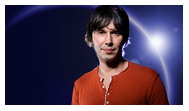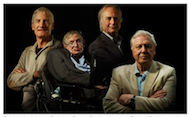I’m very encouraged by a recent trend for science programming. The trend throughout is an agnostic view of the universe. Nothing said in the programmes denies the existence of the supernatural but at the same time they ask questions and reveal answers which directly infer that we are but microscopic motes in a macrocosm. We are certainly not in the centre of the universe.
BBC
- Wonders of the Solar System with Professor Brian Cox (to be followed up with Wonders of the Universe now filming)

- The Story of Science: Power, Proof and Passion with Michael Moseley

Channel 4
- Genius of Britain with Stephen Hawking, Richard Dawkins, James Dyson, David Attenborough, Robert Winston, Paul Nurse, Jim Al-Khalili, Kathy Sykes and Olivia Judson

You can catch these programmes from these links (may be limited to UK only).
I am inspired. The story of how the Invisible College were formed, with the patronage of the king, into the Royal Society. The story of how the Penny Universities formed around coffee houses in London. The dual purpose of the Monument to the Great Fire as both memento and scientific instrument.
I know there are two humanist groups (Belfast Humanists and Humani) in Northern Ireland but I’m not interested in the Humanist agenda, per se, more in the investigation and promotion of science over superstition.
I hope I’m not alone in this.
Matt,
You seem to be slightly confused. First you mention two humanist groups, and then you say you’re not interested in the Humanist agenda. You also seem to be making the common mistake of assuming that a religious conviction precludes an active interest in science.
I personally know several active researchers in the sciences with strong religious beliefs. Many of the great scientists in the past thought of science as a means of exploring God’s creation – Isaac Newton notably. You won’t be the first or the last person to attempt to make a demarcation between science and religion. Unfortunately, this says more about your own personal beliefs than it does about the relationship between these two great disciplines.
Personally, I think is great to see more scientific programmes on TV. Hopefully, it can show people the benefits of a scientific education, after years of dumbing down the curriculum here in the UK.
Hi Andy,
No, I’m not confused. While I may describe myself as a humanist it is only because I believe that religion cheapens humanity – reduces it. I believe that organised religion has held us back more than it has advanced us in the last few centuries. As soon as religion goes beyond a personal experience and starts to become enshrined in law, in culture and in tradition, then we may as well be grubbing turnips out of a field in the dark ages.
I have no problems believing that many great scientists have religious beliefs and how the reconcile some of them is a very personal experience. But that generalisation is so weeping as to be worthless. Asking them the relevant question with regards to the origin of the universe and you’ll quickly be able to tell the difference. One in particular professed that fossils were part of a puzzle left by the Devil to induce doubt. I mean – come on!!!!!
To use Isaac Newton as an example cheapens your point. Newton may have been brilliant but he was a man of his times when the authority of the Church was absolute. We are not in those times now. We don’t need the same crutches and, due to education and communication, we don’t fall as easily for the same bluffing.